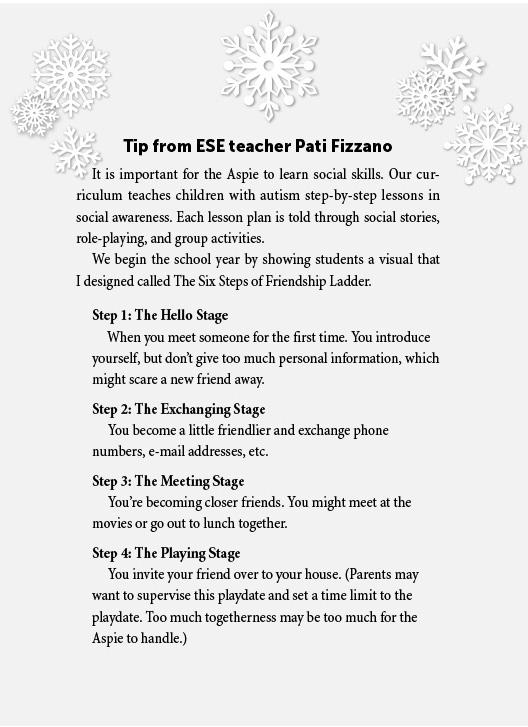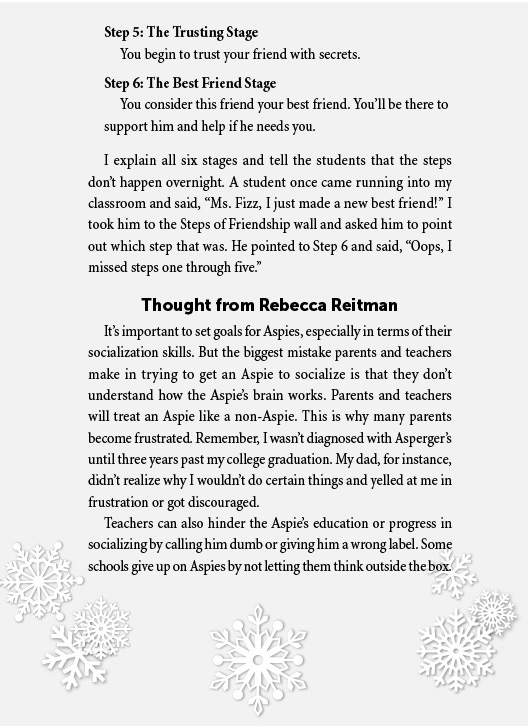
Friendship is the only thing
in the world concerning the usefulness
of which all mankind is agreed.
— Cicero
Helpful Hint: As they go through life, Aspies need the same social skills as any other member of society. But because of their social awkwardness, they have a hard time developing these skills. It’s your job to make sure they get the training that will enable them to socialize to the best of their abilities. Preparation, role-playing, and practice are important tools to help them learn socialization skills.
Principle: Call it a stereotype or defining trait, but if there’s one constant among individuals with Asperger’s syndrome, it’s that they have a hard time socializing. They’re socially awkward and uncomfortable around people. Many of them prefer being alone, in their rooms, often at their computers. (Remember, one size doesn’t fit all. Some folks with Aspie traits do just fine socially. If your Aspie is doing well in social situations, that’s great. Remember what I said about who am I calling an Aspie. If a chapter or an Aspertool works, use it. If not, just skip it.)
When they’re young children, most Aspies want lots of friends. But they soon learn it’s hard to make friends and hard to keep them if they don’t know how to start a conversation (or end one). Playdates with non-Aspies can be tense affairs; the Aspie tends to follow rules, and if the playmate doesn’t, the Aspie may get frustrated and start a fight. Even a playdate with two Aspies can be a challenge; some parents of Aspies don’t like to have other Aspies over because of the potential meltdowns. (Of course, these parents may not want to admit to themselves, let alone others, that their children have any label, let alone Asperger’s. One reason for this book is to tackle the unintentional cluelessness that’s out there at every level, from society at large to the parents of Aspies themselves. I include myself as a former totally clueless parent who is now just a little bit less clueless.)
If an Aspie’s repeated attempts at socializing result in a series of psychological smackdowns, he will understandably retreat to the comfort zone of solitude. Give Aspies the choice of engaging in an activity that forces them to leave that womb, and they’ll in all likelihood refuse.
So your goal is to provide safe situations in which Aspies can practice social skills and even socialize to some degree. You’ll have to provide these situations gradually. The more organized activities you can get Aspies into at an early age, the better their social development will be. A dance class is doubly beneficial, because it helps with their physicality and coordination and brings them together with other kids. Organized sports that are safe (I don’t condone dangerous sports like boxing, motor racing, or football) and properly coached are also a possibility for many Aspies. Rebecca was a cross-country runner and also played softball. Any sport with a deep regimen can help them succeed, because they typically like the repetitiveness. Controlled sleepovers can be beneficial.
(To this day, my adult daughter rarely misses an opportunity to remind me that when she was a child, her mom and I did not allow her to experience social situations, such as sleepovers, on her own often enough. She cuts us no slack over our concern back then over the twenty-three vascular tumors in her brain, her two life-saving [against all odds] brain surgeries, her seizure disorder, her extremely trusting and naïve nature, and the meanness of some other kids. When I protest, she quickly adds, “Dad, if you don’t want the truth, don’t ask.”)
When Aspies start going to school, their teachers will hopefully instruct them in socialization skills. Mainstreaming refers to the practice of educating students with special needs in regular classes during specific time periods based on their skill levels. School is a mainstreaming activity for the Aspie, but it can be a challenging environment. Teachers, even those in the special needs area, are often not as knowledgeable as they could be about the specifics of Asperger’s. Many classmates can be cruel and will pick on another kid who is socially inept. Bottom line: many problems are associated with the admirable practice of mainstreaming.
On the other hand, some Aspie students are able to initiate interactions with other students. They may exhibit the need to take control and direct social situations according to their own social rules and limited social understanding. This means that these interactions do not constitute a true give-and-take social relationship; they primarily relate to the Aspie’s wants, needs, and interests. One of the harder lessons many Aspies need to learn is that “it’s not all about you.” (This is a criticism that applies to many of us—people direct it at me all the time. It just shows that, as with all the behaviors discussed in this book, they apply to all of us to some degree, but they are amplified in the Aspie.)
ACTION PLAN: Aspies need to be taught appropriate social skills and interactions. They need to be shown how their words and actions impact others. Parents and teachers must realize that the Aspie may not understand common social interactions, may not get jokes, and may be unable to interpret body language. They may have to teach Aspies what social cues mean in order to help them make friends. They may try to improve an Aspie’s understanding of social interactions and emotional relationships through visual Aspertools, such as “social stories” and “social scripts,” as well as conversations depicted in comic strip format. One of the best Aspertools for this is role-playing—practicing social situations.
Since many Aspies prefer not to socialize, it’s your responsibility to get them with other people. Mainstream them where possible, but, at the very least, get them into safe situations with other nice people. Will they make friends? Find romance? Get married one day? These are all possibilities, but not if they’re sitting in their rooms by themselves. “You can’t hit a home run unless you step up to the plate and swing the bat,” is how Paul Kaliades, my lifelong friend and fellow Jersey City stickball player, put it. Of course, if your Aspie doesn’t want to step up to the plate, it’s your responsibility to nudge him there.

Imagine you’re an Aspie. You are twenty-three and your parents have talked you into going to a party, saying you’ll have a good time. As you walk into a room full of strangers, your hypersenses are assaulted by a rush of noises and smells. So many conversations at once, and everyone is wearing a pungent cologne or perfume. The lights are flashing. Your brain is being pummeled on many fronts, and the effect on your nerves is like someone running his fingernails down a blackboard.
A couple invades your personal space and begins asking you questions, making jokes, gesturing. You can’t read their verbal cues or their body language. When you try to take part in the conversation, you take everything they say literally. You’re way off base. You start talking about your interests and you don’t know when to stop because you can’t read their cues. Finally the couple walks away. A distant relative you’ve met once or twice recognizes you and gives you a big bear hug, then moves on when you do not know how to respond. Your anxiety is going through the roof. But no one can tell, because they’re not looking at your repetitive hand movements. They don’t notice your smile is phony. You’re exhausted and humiliated. You can’t cope with this right now. Why can’t your folks understand that it’s easier for you to sit alone in your room?
Socialization is possible for Aspies. Henry was an Aspie who, after graduating high school, stayed home alone every day for six months straight. He had no desire to socialize with anyone. Finally his worried parents learned of a nearby meet-up group for Aspies. It took them several weeks of coaxing, but they finally convinced their son to go. Henry met some peers and discovered he actually liked the experience of socializing. Now he goes to the group weekly and meets with other Aspies. His socialization skills are improving, and he’s developing friendships.
A friend’s twenty-one-year-old son, Joel, had fully retreated into his comfort zone of solitude. To pry his son out of his room, the father got Joel a job at a small family-owned restaurant. Joel enjoyed his work and began to blossom. He made friends with some of the other employees. He liked earning money. It was a turning point in his life. He is now much more comfortable socially, is pursuing other activities, and wants to move up the ladder at work.
ACTION PLAN: Getting your Aspie to take part in a safe activity with nice people is infinitely preferable to his sitting alone in his room. In fact, learning socially acceptable behavior so he can have positive interactions with other individuals is mandatory. Training and role-playing are key Aspertools for getting your Aspie to socialize. Start small, with Asperger’s meet-up groups, which provide structure and daily activities for participants. Then consider moving up to groups of people with similar interests, like a book club, a movie club, or even a writer’s club. Getting a job can be a real game changer—it’s the equivalent of throwing him into the socialization pool headfirst. But the bottom line is that whatever gets him into the presence of other people in a nurturing and productive manner is a plus.
Never give up. An Aspie’s social skills can be improved at any age, even well into adulthood. Adult Aspies also have plenty of potential to grow into change. Let’s not discriminate against Aspies because of their calendar age.


